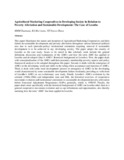Please use this identifier to cite or link to this item:
https://cris.library.msu.ac.zw//handle/11408/1782Full metadata record
| DC Field | Value | Language |
|---|---|---|
| dc.contributor.author | Daemane, Moses, M. M. | - |
| dc.contributor.author | Mot’soene, Keneuoe, A. | - |
| dc.contributor.author | Nyawo-Shava, Vongai Z. | - |
| dc.date.accessioned | 2016-09-04T14:02:11Z | - |
| dc.date.available | 2016-09-04T14:02:11Z | - |
| dc.date.issued | 2010 | - |
| dc.identifier.uri | http://www.ajol.info/index.php/ahds/article/view/98058 | - |
| dc.identifier.uri | http://hdl.handle.net/11408/1782 | - |
| dc.description.abstract | This paper illuminates the nature and inception of Agricultural Marketing Cooperatives and their failure in sustainable development and poverty alleviation throughout various historical-political eras due to such (periodic-policy) institutional constraints requiring removal if sustainable development is to be achieved in any developing society. The paper adopts the country of Lesotho as the case study. Issues to be raised in this scholarly work include the general definition, discussion and explanation of the AMCs and how the term AMC has applied to Lesotho and developed (that is AMCs’ historical background in Lesotho). First, the paper deals with conceptualization of the AMCs and their peasantry membership poverty aspects and policy framework analysis to be adopted throughout this paper. Second, it deals with the emergence of AMCs in the developing world and shifts in the ruling elitist acceptance and rejection of AMCs. Third, it deals with some 'rural development' process to emergence of AMCs in the developing world characterized by some sustainable development failure resultantly providing us with more of Lesotho's AMCs as an evolutionary case study. Fourth, Lesotho's AMCs evolution by the colonial (1940s-1966) and independent state and fifth, the historical overview of cooperative movement evolution and institutional constraints to sustainable development/poverty alleviation before Structural Adjustment Programmes (SAPs) generally, which is 1948-95. Finally, the paper deals more specifically with the historical background of AMCs in Lesotho other than in a general cooperative movement evolution and co-ops tribulations and opportunities, also thereby narrating how the term ‘AMC‘ has been applied in Lesotho. | en_US |
| dc.language.iso | en | en_US |
| dc.publisher | Annals of Humanities and Development Studies | en_US |
| dc.relation.ispartofseries | Annals of Humanities and Development Studies;Vol. 1, No. 1; p. p. 436-476 | - |
| dc.subject | Agricultural Marketing Cooperatives | en_US |
| dc.title | Agricultural Marketing Cooperatives in Developing Society in Relation to Poverty Alleviation and Sustainable Development: the case of Lesotho | en_US |
| dc.type | Article | en_US |
| item.openairetype | Article | - |
| item.languageiso639-1 | en | - |
| item.openairecristype | http://purl.org/coar/resource_type/c_18cf | - |
| item.cerifentitytype | Publications | - |
| item.grantfulltext | open | - |
| item.fulltext | With Fulltext | - |
| Appears in Collections: | Research Papers | |
Files in This Item:
| File | Description | Size | Format | |
|---|---|---|---|---|
| agric marketing.pdf | Abstract | 17.5 kB | Adobe PDF |  View/Open |
Items in MSUIR are protected by copyright, with all rights reserved, unless otherwise indicated.



